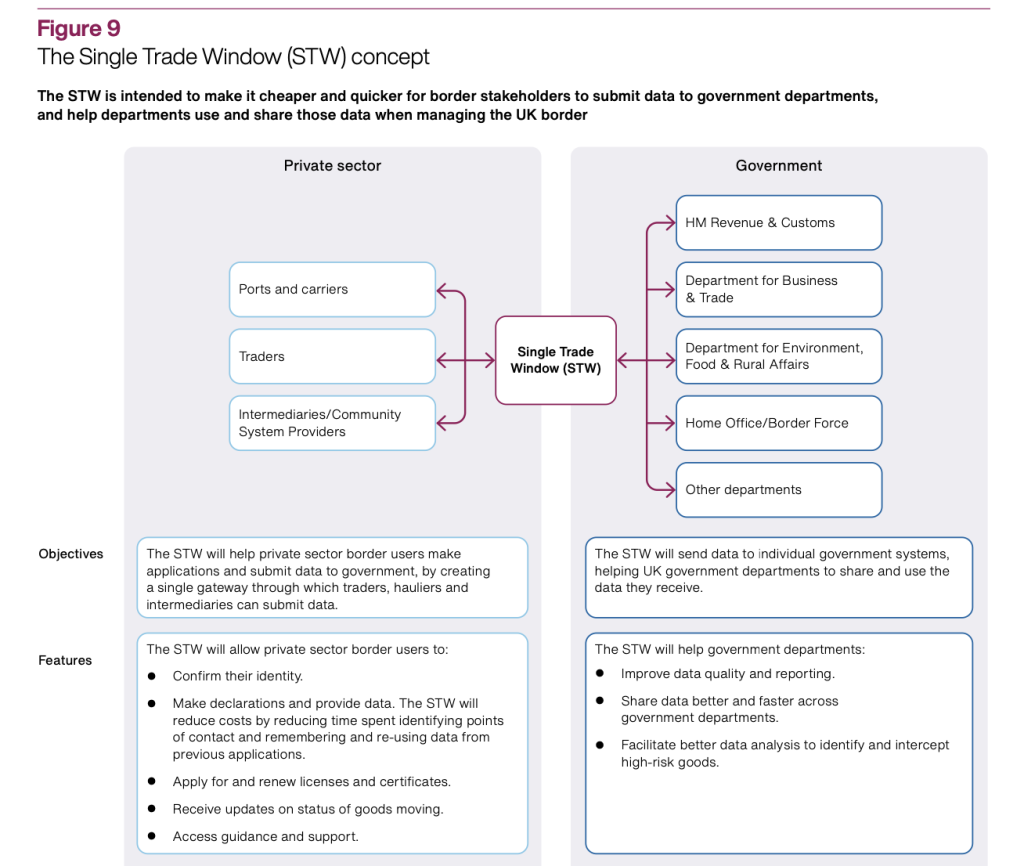Estimated reading time: 0 minutes
The UK government has announced its plans to halt the development of the Single Trade Window (STW), a digital service that would have streamlined data exchange for cross-border trade.
In a statement to the House of Commons last week, the Exchequer Secretary to the Treasury James Murray cited “financial challenges” as the cause for the rollback. The government will provide an update on the program in Spring 2025 as part of its Spending Review.
The pause is intended to “give the government an opportunity to take stock and further engage with traders, ports, software developers and its other key stakeholders” to produce a plan for the future operation of the UK border, said HMRC in a statement.

Source: National Audit Office
The STW would have provided importers and exporters with a single portal to submit all the documents necessary to move goods across borders. The proposed system would have unified all requirements on one digital portal managed by HMRC, making it easier for the government to collect and process the data.
Under the current system, traders have to submit information and documents to a wide range of government agencies, which can be time-consuming and inefficient.
The STW formed a crucial part of the UK’s post-Brexit border strategy, simplifying compliance with new regulations for goods imported from the EU. Implementation of new regulations on goods from EU countries was delayed six times already, most recently in September of this year, pending more investigation on their effect on prices.
The EU is by far the UK’s largest trading partner, exchanging a total £822 billion worth of goods each year. But Brexit has raised customs regulations and restrictions, which has led to long delays, increased prices, and an estimated cost UK businesses of at least £7.5 billion.
Almost nine years after the Brexit referendum, many of the forecasted regulations are not yet in place, with negotiations between the EU, UK, and businesses still ongoing. The STW would have been an important step to facilitate regulations, simplify logistics for companies, and reduce fears of long bottlenecks at the border.

STWs are a widespread system to simplify customs processes and streamline trade; in 2018, 41 countries had a version of the system operating and 78 were in the process of developing one.
UN Trade and Development has hailed the model as a solution to reduce barriers to accessing international trade and encourage the movement of goods between countries; similar initiatives in New Zealand, Nigeria, and Timor Leste have significantly reduced wait times to receive import permits and submit documents to customs authorities.
The UK STW, which was being developed by Deloitte and IBM, was forecasted to cost £349 million but lead to an almost £3 billion increase in productivity over 10 years. However, the high price tag and ambitious goals led some to doubt its actual potential. In a report on the UK’s border strategy, the National Audit Office reported that “the [STW]’s objectives and timescales are overly optimistic and continue to underestimate the complexity of what is required.” The system, originally planned to launch in October, was delayed previously to January 2025 after difficulties with integrating government agencies into the platform; it has now been pushed back to 2026 at the earliest.
Many in the industry have criticised the STW’s halt, which has slashed hopes of a more accessible and efficient UK trading landscape. Emma Rowland, Trade Policy Advisor at the Institute of Directors, said, “It is frustrating to see the government’s decision to halt the development of the Single Trade Window due to financial constraints following the Budget. We urge the government to prioritise the Single Trade Window in the upcoming Spring Spending Review to facilitate trade for all UK companies.
However, the pause could be useful to consult with businesses on their specific needs and how to tailor the STW to them. Ilona Kawka, Digital Trade and Customs Specialist at the Chartered Institute of Export and International Trade, said, “The pause in the Single Trade Window development gives the industry time to continue developing and raising awareness of these solutions in the business community.”





























